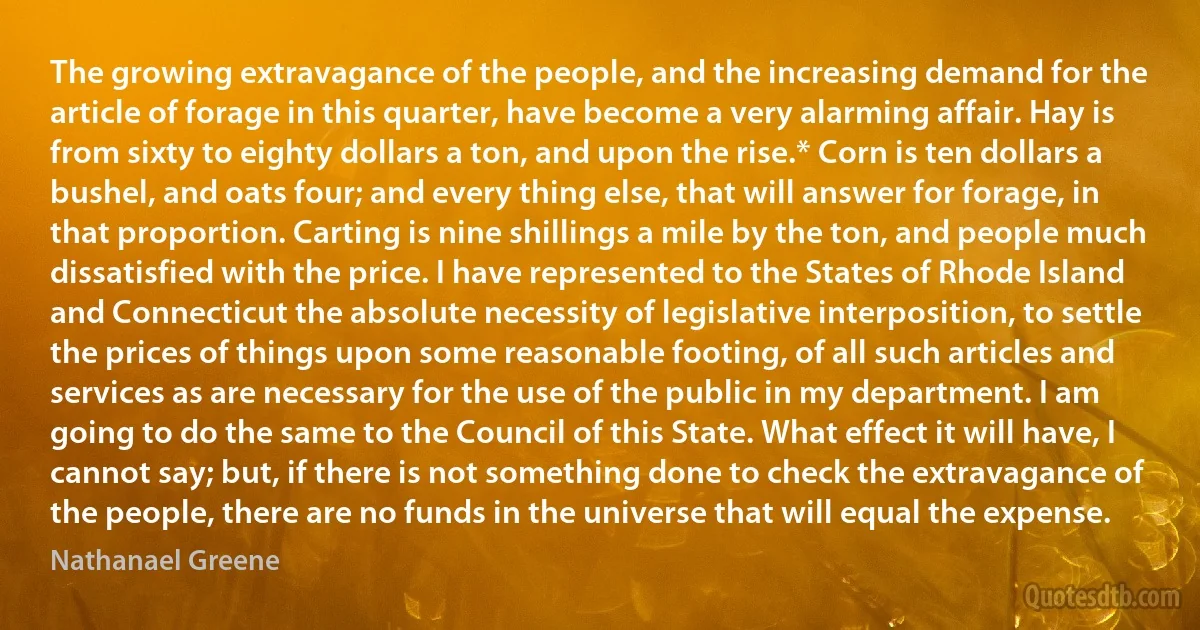Quarter Quotes - page 6
On the evening of the 29th, the army fell back to the north end of the Island. The next morning, the enemy advanced upon us in two columns upon the east and west road. Our light troops, commanded by Colonel Livingston and Colonel Laurens, attacked the heads of the columns about seven o'clock in the morning, but were beat back they were reinforced with a regiment upon each road. The enemy still proved too strong. General Sullivan formed the army in order of battle, and resolved to wait their approach upon the ground we were encamped on, and sent orders to the light troops to fall back. The enemy came up and formed upon Quaker Hill, a very strong piece of ground, within about one mile and a quarter of our line. We were well posted, with strong works in our rear, and a strong redoubt in front, partly upon the right of the line.

Nathanael Greene
From the representation of both the Commissary-General and the Foragemaster-General, I find your Excellency will be obliged to quarter the troops in New Jersey. The great consumption of forage, that has taken place in this State for five months past, will render it very difficult to provide for this garrison, and the different posts of communication.

Nathanael Greene
Somehow the word started coming back - some people still had breath to spare, apparently. The word was this hill was a quarter of a mile long. The word was it was two miles long. The word was that no Walker had ever gotten a ticket on this hill. The word was that three boys had gotten tickets here just last year. And after that, the word stopped coming back.

Stephen King
The news is all rapes and murders we didn't commit, funerals we don't attend, AIDS we don't want to catch. All crammed into a quarter of a minute! But at least we still have a hand with which to switch channels or turn off altogether. I tell my lecture audiences to never, ever watch local TV news.

Ray Bradbury
The world is desperately imperfect. Even if a quarter of the working people were engrossed in new thoughts and inventions and lived off the others, humanity would still gain tremendously thanks to the constant stream of inventions and intellectual work emerging from this horde of people striving upward.

Konstantin Tsiolkovsky
Luke had to use all his willpower to keep from drinking the whole sixteen-ounce bottle of water at a single go. He left a quarter of it, set it down, then snatched it up again and screwed on the cap. He thought if the train took a sudden yaw and it spilled, he would go insane. He gobbled the sausage biscuit in five snatching bites and chased it with another big swallow of water. He licked the grease from his palm, then took the water and the Hostess pie and crept back into his nest. For the first time since riding down the river in the S. S. Pokey and looking up at the stars, he felt that his life might be worth living. And although he did not exactly believe in God, having found the evidence against just slightly stronger than the evidence for, he prayed anyway, but not for himself. He prayed for the highly hypothetical higher power to bless the man who had called him outlaw and thrown that brown bag into the boxcar.

Stephen King
In the present great era of reform, when unjust Governments are falling in every quarter of Europe; when religious persecution is compelled to abjure her tyranny over conscience; when the rights of men are ascertained in theory and that theory substantiated by practice; when antiquity can no longer defend absurd and oppressive forms against the common sense and common interests of mankind; when all government is acknowledged to originate from the people and to be so far only obligatory as it protects their rights and promotes their welfare: we think it our duty, as Irishmen, to come forward and state what we feel to be our heavy grievance and what we know to be its effectual remedy.

Theobald Wolfe Tone
"It is an evil, sir, an unmitigated evil," Lincoln said. "I shall never forget the group of chained Negroes I saw going down the river to be sold close to a quarter of a century ago. Never was there so much misery, all in one place. If your secession triumphs, the South will be a pariah among nations." "We shall be recognized as what we are, a nation among nations," Lee returned. "And, let me repeat, my being here is a sign secession has triumphed. What I would seek to do now, subject to the ratification of my superiors, is suggest terms to halt the war between the United States and Confederate States." Lincoln refused to call Lee's country by its proper name. As a small measure of revenge, Lee put extra weight on that name. Lincoln sighed. This was the moment he had tried to evade, but there was no evading it, not with the commander of the Army of Northern Virginia in his parlor. "Name your terms, General," he said in a voice full of ashes.

Harry Turtledove
Nobody draws the light for covered wine rooms from the south or west, but rather from the north, since that quarter is never subject to change but is always constant and unshifting. So it is with granaries: grain exposed to the sun's course soon loses its good quality, and provisions and fruit, unless stored in a place unexposed to the sun's course, do not keep long.

Vitruvius
If I had been by nature extremely quick of apprehension, or had possessed a very accurate and retentive memory or were of a remarkably active and energetic character, the trial would not be conclusive; but in all these natural gifts I am rather below than above par; what I could do, could assuredly be done by any boy or girl of average capacity and healthy physical constitution: and if I have accomplished anything, I owe it, among other fortunate circumstances, to the fact that through the early training bestowed on me by my father, I started, I may fairly say, with an advantage of a quarter of a century over my contemporaries.

John Stuart Mill
Some have recently argued that pluralism by its very nature demands civic secularism. There seems to be no logical reason why respect for the beliefs of more than a quarter billion Americans, 90 percent of whom declare themselves to be religious, should require us now to eschew the public expression of religion, even in discussing political affairs that have moral foundations or implications.

Francis George
In another place, this learned geographer (Strabo), in alluding to the tradition that Sicily had been separated by a convulsion from Italy, remarks, that at present the land near the sea in those parts was rarely shaken by earthquakes, since there were now open orifices whereby fire and ignited matters and waters escaped; but formerly, when the volcanoes of Etna, the Lipari Islands, Ischia, and others, were closed up, the imprisoned fire and wind might have produced far more vehement movements. The doctrine, therefore, that volcanoes are safety valves, and that the subterranean convulsions are probably most violent when first the volcanic energy shifts itself to a new quarter, is not modern.

Charles Lyell


![We shot the first five seasons up in Vancouver, so we were protected from the public mania, and the industry mania, for the most part. I was first exposed to it when I became pregnant in the first season, and I quickly learned the power of the machine; then again when I was trying to negotiate my salary to be closer to equal to what David [Duchovny] was making, rather than a quarter. Yes, it's been an ongoing education, but it continues to astound me. (Gillian Anderson)](https://cdn.quotesdtb.com/img/quotes_images_webp/49/gillian-anderson-closer-education-477149.webp)
